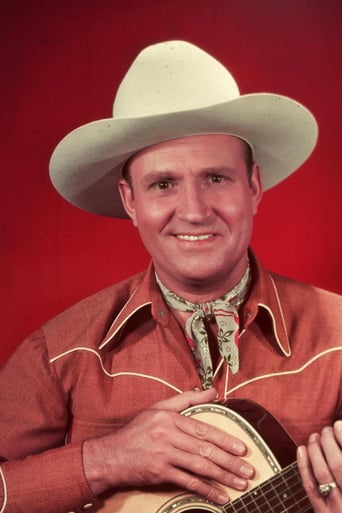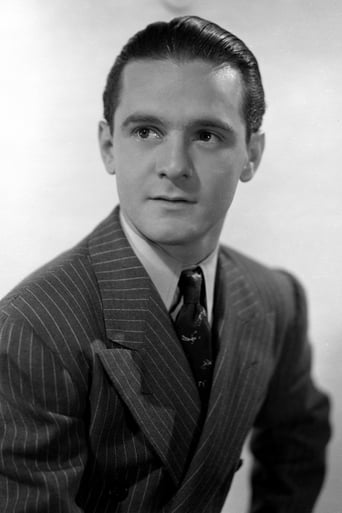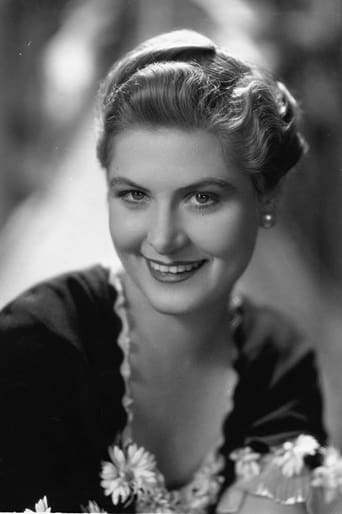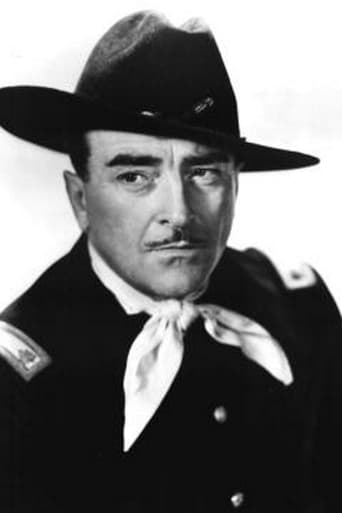disinterested_spectator
Gene Autry, playing himself, is half-owner of Radio Ranch, where people come to stay as paying guests and from which Autry broadcasts a radio program every day. In the first chapter, after singing a song, he introduces Frankie and his sister Betsy, his partner's children, who head a club for teenagers sponsored by Radio Ranch called Junior Thunder Riders. They tell about how one day they saw a bunch of men with capes and helmets riding horses that sounded like thunder, though they do not know who those men were. Nevertheless, Frankie and Betsy formed the club, the members of which wear capes and helmets modeled after the ones worn by the original Thunder Riders, as they call them. Then Autry narrates the next installment of a serial within this serial in which the Junior Thunder Riders ride to the rescue to save a man and his wife from a bunch of bandits. You might think that since this is a radio serial, only dialogue and sound effects would be involved, but they actually act out the parts, almost as if it were being filmed, which, I guess, in a way it is.Meanwhile, a bunch of men fly in by airplane, who we quickly figure are up to no good. One of them, Professor Beetson, believes that somewhere underneath Radio Ranch is Murania, populated by descendants of the ancient city of Mu, who moved underground to escape the glaciers a hundred thousand years ago. Beetson believes they will find valuable deposits of radium and secrets that have been lost to the world, technology based on their knowledge of radiation. Their plan is to get rid of Autry, either by killing him, framing him for a murder, or by causing him to miss a broadcast, which will result in the loss of his radio contract. Either way, they figure the ranch will become deserted, giving them the freedom to look for Murania without being disturbed. This plot point leads to several ludicrous situations in which Autry is fleeing from the Thunder Riders, from the scientists, or from the sheriff, and right in the middle of it all has to worry about getting back to the ranch in time to sing another song.All this is on the surface. Meanwhile, twenty-five thousand feet below the ranch is Murania, where the original Thunder Riders live, when they are not galloping about on the surface for whatever reason. There are, of course, the expected absurdities in this lost city, such as that everyone speaks English. More interesting is the mixture of ancient and futuristic technology. The Muranians have wireless telephones, and they have television, allowing Queen Tika to view what is going on anywhere on the planet, mostly in America. They have all sorts of advanced weaponry, such as guided missiles, and yet the guards carry spears. They have robots to perform the manual labor, but the ones that are armed have swords. Moreover, when the Thunder Riders need to enter or leave Murania, they have a robot turn a crank to open the door, instead of simply having the equivalent of a garage-door opener. To block the path of anyone not authorized to pass by an entrance, there is a robot standing off to the side with a sword held erect. When activated by a button on his chest, an infraray tells it if someone is trying to pass, at which point it comes down with its sword. So, later in the serial, when Frankie and Betsy get to that robot, Frankie presses the off button on the robot, and then they go right past him without a problem. That's Yankee ingenuity for you.Their government seems to be a bit of a mixture as well. As noted, there is a queen who rules over her subjects. However, she refers to one of the wounded soldiers as a "comrade," a term not normally used in monarchies, but which would have suggested a communist state like the Soviet Union in 1935. And there is reference to the "secret police." When she watches the television to see what is going on in the world, she is contemptuous of the insanity she witnesses, calling the surface people fools, who are always in a hurry, their lives full of death and suffering. You might think from this that Murania must be an enlightened utopia, but when the captain of the Thunder Riders fails to capture Autry as she commanded, she starts to put him to death for incompetence, but then decides that lashes with a whip will be a better punishment. She wants Autry captured so that she can drive him off Radio Ranch, because she fears that surface people will discover Murania and invade it.When the captain fails a second time, she commands Lord Argo to put him to death in the Lightening Chamber. But once inside, Argo tells the captain that every time someone is supposedly put to death (thirty-seven so far this year), he saves him so he can be part of the rebellion he is planning. The captain agrees to join the rebellion, and so his execution is faked. When Queen Tika, who has people whipped or executed for merely failing to carry out her orders, despite their best efforts, finds out about the rebellion, she cannot understand why people are turning against her. After all, she knows she has been a good queen, because that is what her underlings tell her when they are asked. Later, Betsy says what most of us have been thinking, that Queen Tika reminds us of the one in "Alice in Wonderland," always shouting, "Off with his head."In the end, Murania is destroyed by its own technology, the bad guys are arrested, and Autry manages to get back to Radio Ranch in time to sing the final song of the season.
tedg
I'm involved in a study of "folding" in film; folding is a matter of overlain or referenced narratives. Sometimes the folding is something only of interest to highbrow specialists, but usually it is a matter of fun.Some folding is a matter of introducing bizarre conventions, and once they enter in one film they promulgate throughout the system. And then through our imagination. So part of my study is looking for examples of folding and most especially the first appearance of specific types.This serial is usually considered an oddball secondrater compared to more famous (if not better) examples. But I am putting it on my list of films that everyone should see before they die. This brief description should indicate why, for those not excited about sitting through five hours of mediocre production.Gene Autry was already a famous radio star before making this. He was the first one to combine hee haw Appalachian folk music with the notion of a western cowboy to create the so-called "singing cowboy." The juxtaposition is amazing if you know the history, and in fact the subsequent history of "country and western" music (now just "country") spins from this one man. But that's all before this.This is his first movie, so they preserved the radio show. Every day at 2:00, Gene (playing himself) must give a show or lose his ranch. The show is live from that "radio ranch," where his ranch helpers play parts in the show. Okay: one simple fold, right? Now add: in producing the show instead of just doing sound effects and voices, the players actually do what they are portraying. Odd. (Another fold.)The purpose of the ranch is to provide a place for kids to do their "ridin and ropin" stuff, and indeed there are kids in attendance who form a secret society called the "thunder riders" after local legends (and experiences) seeing bands of riders inexplicably accompanied by thunder. This gang of kids is at the same time a feature of the story of the radio show, inhabitants of the ranch, and participants in the larger story we'll elaborate in a bit. A feature of the radio show is recruiting kids at home to join the riders in a sort of boy scout affiliation.Gene's ranch happens to sit on a radium deposit. Nuclear fission, even the idea, would be years away but radioactive stuff held a special place in the popular imagination. Needless to say, there is an evil professor and henchmen who want to eliminate Autry so they can get the radium. So far so good.But there is also a subterranean culture under the ranch as well, a huge city at 20,000 feet under, sustained by the radiation and rebellious robots. (Note: this is _before_ "Flash Gordon.") They have all sorts of advanced gadgets including something that gives their evil young queen effective remote vision, providing her with the creation of the movie. They, too, want Autry eliminated. The original "thunder riders" are the special forces of this city who emerge for whatever project is at hand.Thus, science fiction takes to horses and indeed every time some motion is needed as a break from the talking (and singing!) heads, there's a passel of panicky ridin, usually in groups of 20-30, which seems to be the most that can fit in a frame.The serial consists of all the ordinary captures and escapes (always by 2:00!) you might expect. In that sense, the thing is pretty ordinary, excepting that the substance of the radio show and the movie overlap and separate constantly. Its the novelty and complete oddity of the strange framework that makes the thing interesting and important. Film would never be the same after.The framework is clearly a matter of psychotropic hallucination, and indeed you can see the very same folded structure in the similarly drugged out "Tell your Children" written immediately after.If you decide to see it, don't use the DVD (which is technically horrible and is missing key elements), nor the silly movie they edited out of it. The VHS tapes are the thing to seek out.Ted's Evaluation -- 4 of 3: Every cineliterate person should experience this.
counterrevolutionary
Gene Autry was already a radio star when he went to Hollywood in the early '30s. Naturally, since Autry was known as "the Singing Cowboy," his first starring role was in a sci-fi serial about an underground civilization. One might think that this was a brave example of casting against type; in fact, Autry plays exactly the same character he would continue to play on film and TV for the next twenty years: "Gene Autry, the Singing Cowboy."With a premise like this, one would expect THE PHANTOM EMPIRE to be thoroughly goofy. And one would be right. It doesn't help matters that the serial is directed exclusively to children, without even a nod or wink at the adult audience. Also, the cliffhanger cheat factor is fairly high, mostly involving added footage of the escapes which completely distorts what we saw in the previous chapter (this would, of course, have been somewhat less obvious when seeing only one chapter a week and not having a rewind button).But if you're a connoisseur of cinematic goofiness, or if you're interested in B-Westerns and SF serials of the 30s, or if you have a burning desire to see Smiley Burnette in drag, you should check this one out. The Alpha DVD release, as others have said, is pretty poor (the worst Alpha DVDs I've seen, in fact), but if you can get through the first two chapters, the quality improves marginally (there does seem to have been some restoration work done on the print used--mainly with Scotch tape).



